Entrepreneurship and Small Business Management
VerifiedAdded on 2020/12/29
|14
|4743
|443
Project
AI Summary
This project provides a comprehensive analysis of entrepreneurship, covering various types of entrepreneurial ventures, their impact on the economy, and the characteristics of successful entrepreneurs. It examines the role of micro and small businesses in economic growth, analyzes the impact of Brexit on small businesses, and discusses the background and experiences that can foster entrepreneurship.
Contribute Materials
Your contribution can guide someone’s learning journey. Share your
documents today.

Entrepreneurship and Small
Business Management
Business Management
Secure Best Marks with AI Grader
Need help grading? Try our AI Grader for instant feedback on your assignments.
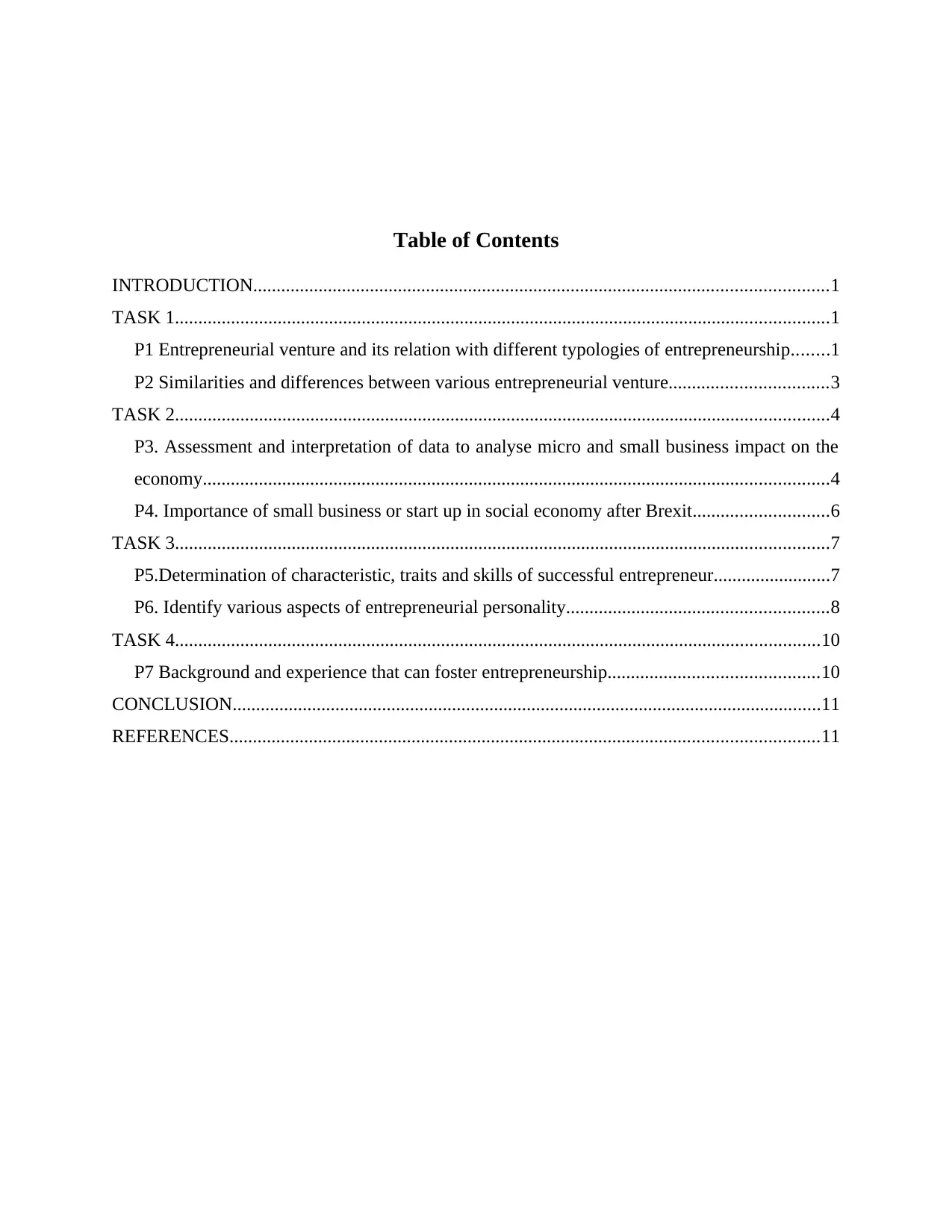
Table of Contents
INTRODUCTION...........................................................................................................................1
TASK 1............................................................................................................................................1
P1 Entrepreneurial venture and its relation with different typologies of entrepreneurship........1
P2 Similarities and differences between various entrepreneurial venture..................................3
TASK 2............................................................................................................................................4
P3. Assessment and interpretation of data to analyse micro and small business impact on the
economy......................................................................................................................................4
P4. Importance of small business or start up in social economy after Brexit.............................6
TASK 3............................................................................................................................................7
P5.Determination of characteristic, traits and skills of successful entrepreneur.........................7
P6. Identify various aspects of entrepreneurial personality........................................................8
TASK 4..........................................................................................................................................10
P7 Background and experience that can foster entrepreneurship.............................................10
CONCLUSION..............................................................................................................................11
REFERENCES..............................................................................................................................11
INTRODUCTION...........................................................................................................................1
TASK 1............................................................................................................................................1
P1 Entrepreneurial venture and its relation with different typologies of entrepreneurship........1
P2 Similarities and differences between various entrepreneurial venture..................................3
TASK 2............................................................................................................................................4
P3. Assessment and interpretation of data to analyse micro and small business impact on the
economy......................................................................................................................................4
P4. Importance of small business or start up in social economy after Brexit.............................6
TASK 3............................................................................................................................................7
P5.Determination of characteristic, traits and skills of successful entrepreneur.........................7
P6. Identify various aspects of entrepreneurial personality........................................................8
TASK 4..........................................................................................................................................10
P7 Background and experience that can foster entrepreneurship.............................................10
CONCLUSION..............................................................................................................................11
REFERENCES..............................................................................................................................11
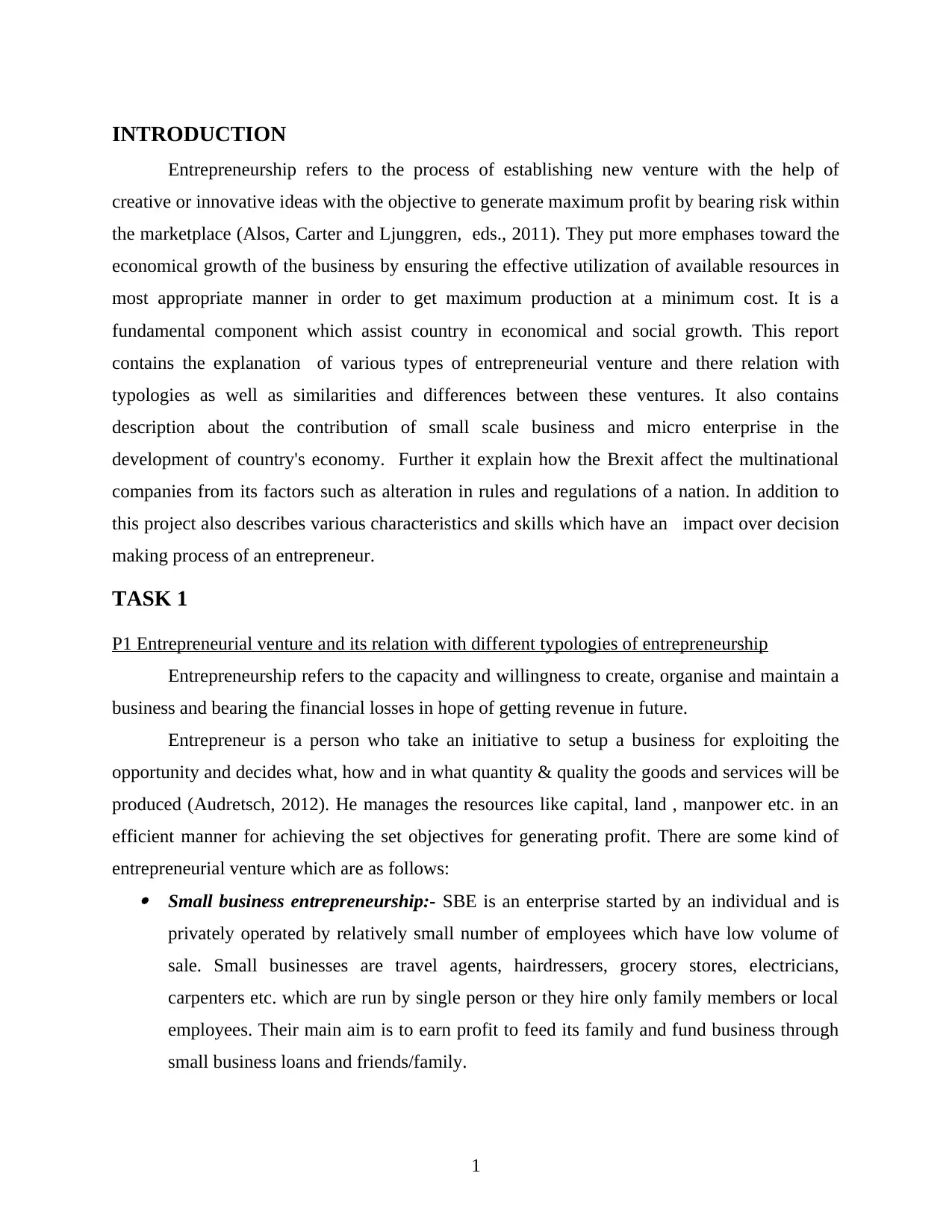
INTRODUCTION
Entrepreneurship refers to the process of establishing new venture with the help of
creative or innovative ideas with the objective to generate maximum profit by bearing risk within
the marketplace (Alsos, Carter and Ljunggren, eds., 2011). They put more emphases toward the
economical growth of the business by ensuring the effective utilization of available resources in
most appropriate manner in order to get maximum production at a minimum cost. It is a
fundamental component which assist country in economical and social growth. This report
contains the explanation of various types of entrepreneurial venture and there relation with
typologies as well as similarities and differences between these ventures. It also contains
description about the contribution of small scale business and micro enterprise in the
development of country's economy. Further it explain how the Brexit affect the multinational
companies from its factors such as alteration in rules and regulations of a nation. In addition to
this project also describes various characteristics and skills which have an impact over decision
making process of an entrepreneur.
TASK 1
P1 Entrepreneurial venture and its relation with different typologies of entrepreneurship
Entrepreneurship refers to the capacity and willingness to create, organise and maintain a
business and bearing the financial losses in hope of getting revenue in future.
Entrepreneur is a person who take an initiative to setup a business for exploiting the
opportunity and decides what, how and in what quantity & quality the goods and services will be
produced (Audretsch, 2012). He manages the resources like capital, land , manpower etc. in an
efficient manner for achieving the set objectives for generating profit. There are some kind of
entrepreneurial venture which are as follows: Small business entrepreneurship:- SBE is an enterprise started by an individual and is
privately operated by relatively small number of employees which have low volume of
sale. Small businesses are travel agents, hairdressers, grocery stores, electricians,
carpenters etc. which are run by single person or they hire only family members or local
employees. Their main aim is to earn profit to feed its family and fund business through
small business loans and friends/family.
1
Entrepreneurship refers to the process of establishing new venture with the help of
creative or innovative ideas with the objective to generate maximum profit by bearing risk within
the marketplace (Alsos, Carter and Ljunggren, eds., 2011). They put more emphases toward the
economical growth of the business by ensuring the effective utilization of available resources in
most appropriate manner in order to get maximum production at a minimum cost. It is a
fundamental component which assist country in economical and social growth. This report
contains the explanation of various types of entrepreneurial venture and there relation with
typologies as well as similarities and differences between these ventures. It also contains
description about the contribution of small scale business and micro enterprise in the
development of country's economy. Further it explain how the Brexit affect the multinational
companies from its factors such as alteration in rules and regulations of a nation. In addition to
this project also describes various characteristics and skills which have an impact over decision
making process of an entrepreneur.
TASK 1
P1 Entrepreneurial venture and its relation with different typologies of entrepreneurship
Entrepreneurship refers to the capacity and willingness to create, organise and maintain a
business and bearing the financial losses in hope of getting revenue in future.
Entrepreneur is a person who take an initiative to setup a business for exploiting the
opportunity and decides what, how and in what quantity & quality the goods and services will be
produced (Audretsch, 2012). He manages the resources like capital, land , manpower etc. in an
efficient manner for achieving the set objectives for generating profit. There are some kind of
entrepreneurial venture which are as follows: Small business entrepreneurship:- SBE is an enterprise started by an individual and is
privately operated by relatively small number of employees which have low volume of
sale. Small businesses are travel agents, hairdressers, grocery stores, electricians,
carpenters etc. which are run by single person or they hire only family members or local
employees. Their main aim is to earn profit to feed its family and fund business through
small business loans and friends/family.
1
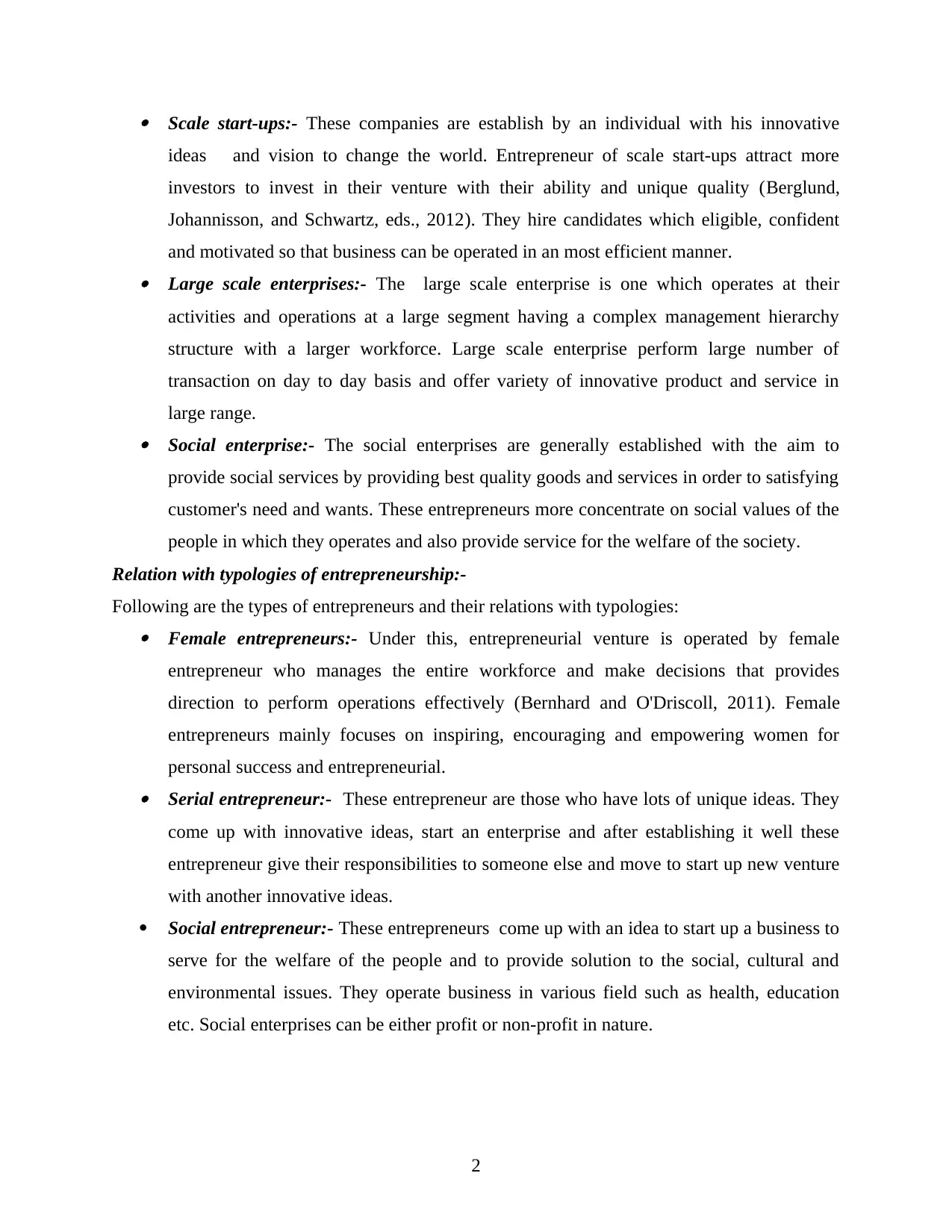
Scale start-ups:- These companies are establish by an individual with his innovative
ideas and vision to change the world. Entrepreneur of scale start-ups attract more
investors to invest in their venture with their ability and unique quality (Berglund,
Johannisson, and Schwartz, eds., 2012). They hire candidates which eligible, confident
and motivated so that business can be operated in an most efficient manner. Large scale enterprises:- The large scale enterprise is one which operates at their
activities and operations at a large segment having a complex management hierarchy
structure with a larger workforce. Large scale enterprise perform large number of
transaction on day to day basis and offer variety of innovative product and service in
large range. Social enterprise:- The social enterprises are generally established with the aim to
provide social services by providing best quality goods and services in order to satisfying
customer's need and wants. These entrepreneurs more concentrate on social values of the
people in which they operates and also provide service for the welfare of the society.
Relation with typologies of entrepreneurship:-
Following are the types of entrepreneurs and their relations with typologies: Female entrepreneurs:- Under this, entrepreneurial venture is operated by female
entrepreneur who manages the entire workforce and make decisions that provides
direction to perform operations effectively (Bernhard and O'Driscoll, 2011). Female
entrepreneurs mainly focuses on inspiring, encouraging and empowering women for
personal success and entrepreneurial. Serial entrepreneur:- These entrepreneur are those who have lots of unique ideas. They
come up with innovative ideas, start an enterprise and after establishing it well these
entrepreneur give their responsibilities to someone else and move to start up new venture
with another innovative ideas.
Social entrepreneur:- These entrepreneurs come up with an idea to start up a business to
serve for the welfare of the people and to provide solution to the social, cultural and
environmental issues. They operate business in various field such as health, education
etc. Social enterprises can be either profit or non-profit in nature.
2
ideas and vision to change the world. Entrepreneur of scale start-ups attract more
investors to invest in their venture with their ability and unique quality (Berglund,
Johannisson, and Schwartz, eds., 2012). They hire candidates which eligible, confident
and motivated so that business can be operated in an most efficient manner. Large scale enterprises:- The large scale enterprise is one which operates at their
activities and operations at a large segment having a complex management hierarchy
structure with a larger workforce. Large scale enterprise perform large number of
transaction on day to day basis and offer variety of innovative product and service in
large range. Social enterprise:- The social enterprises are generally established with the aim to
provide social services by providing best quality goods and services in order to satisfying
customer's need and wants. These entrepreneurs more concentrate on social values of the
people in which they operates and also provide service for the welfare of the society.
Relation with typologies of entrepreneurship:-
Following are the types of entrepreneurs and their relations with typologies: Female entrepreneurs:- Under this, entrepreneurial venture is operated by female
entrepreneur who manages the entire workforce and make decisions that provides
direction to perform operations effectively (Bernhard and O'Driscoll, 2011). Female
entrepreneurs mainly focuses on inspiring, encouraging and empowering women for
personal success and entrepreneurial. Serial entrepreneur:- These entrepreneur are those who have lots of unique ideas. They
come up with innovative ideas, start an enterprise and after establishing it well these
entrepreneur give their responsibilities to someone else and move to start up new venture
with another innovative ideas.
Social entrepreneur:- These entrepreneurs come up with an idea to start up a business to
serve for the welfare of the people and to provide solution to the social, cultural and
environmental issues. They operate business in various field such as health, education
etc. Social enterprises can be either profit or non-profit in nature.
2
Secure Best Marks with AI Grader
Need help grading? Try our AI Grader for instant feedback on your assignments.
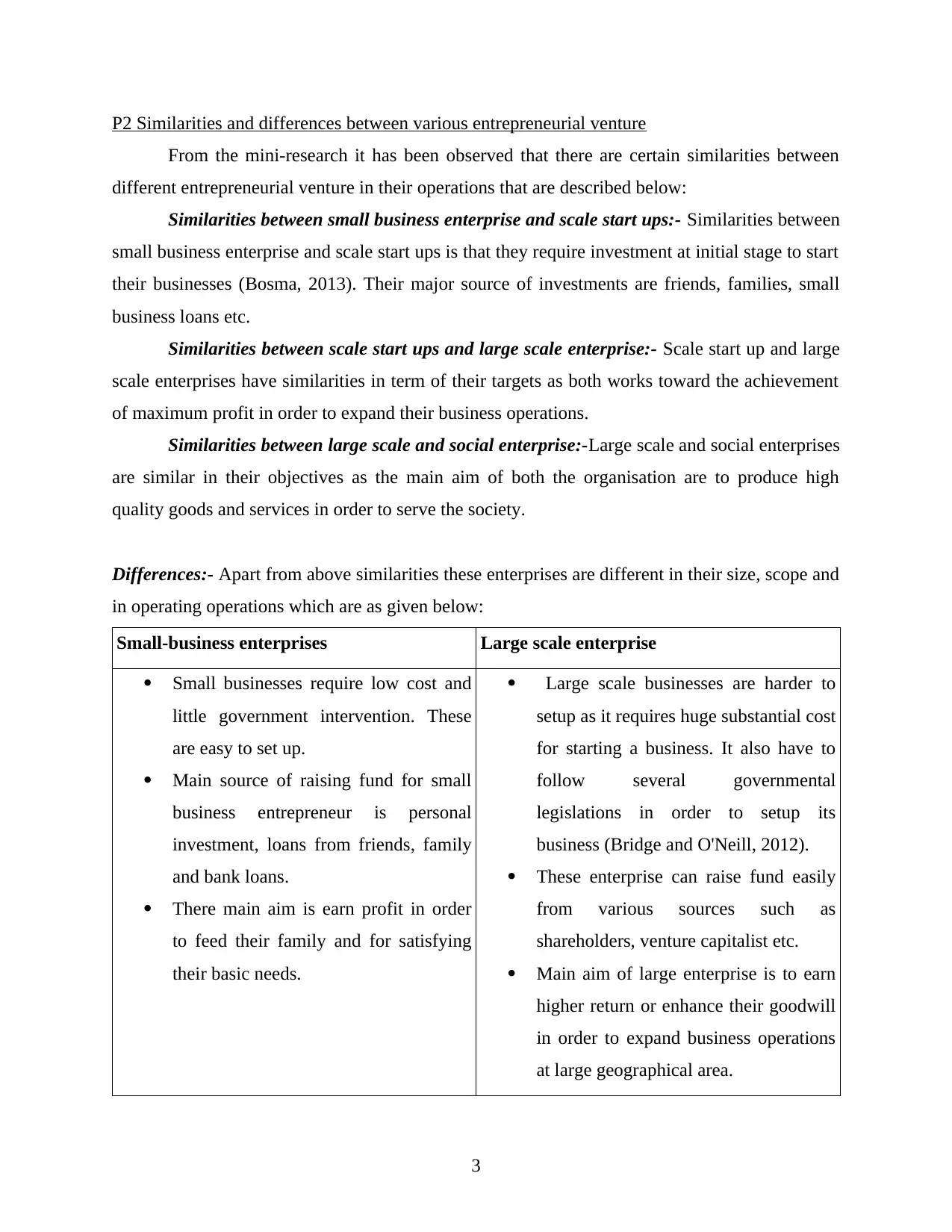
P2 Similarities and differences between various entrepreneurial venture
From the mini-research it has been observed that there are certain similarities between
different entrepreneurial venture in their operations that are described below:
Similarities between small business enterprise and scale start ups:- Similarities between
small business enterprise and scale start ups is that they require investment at initial stage to start
their businesses (Bosma, 2013). Their major source of investments are friends, families, small
business loans etc.
Similarities between scale start ups and large scale enterprise:- Scale start up and large
scale enterprises have similarities in term of their targets as both works toward the achievement
of maximum profit in order to expand their business operations.
Similarities between large scale and social enterprise:-Large scale and social enterprises
are similar in their objectives as the main aim of both the organisation are to produce high
quality goods and services in order to serve the society.
Differences:- Apart from above similarities these enterprises are different in their size, scope and
in operating operations which are as given below:
Small-business enterprises Large scale enterprise
Small businesses require low cost and
little government intervention. These
are easy to set up.
Main source of raising fund for small
business entrepreneur is personal
investment, loans from friends, family
and bank loans.
There main aim is earn profit in order
to feed their family and for satisfying
their basic needs.
Large scale businesses are harder to
setup as it requires huge substantial cost
for starting a business. It also have to
follow several governmental
legislations in order to setup its
business (Bridge and O'Neill, 2012).
These enterprise can raise fund easily
from various sources such as
shareholders, venture capitalist etc.
Main aim of large enterprise is to earn
higher return or enhance their goodwill
in order to expand business operations
at large geographical area.
3
From the mini-research it has been observed that there are certain similarities between
different entrepreneurial venture in their operations that are described below:
Similarities between small business enterprise and scale start ups:- Similarities between
small business enterprise and scale start ups is that they require investment at initial stage to start
their businesses (Bosma, 2013). Their major source of investments are friends, families, small
business loans etc.
Similarities between scale start ups and large scale enterprise:- Scale start up and large
scale enterprises have similarities in term of their targets as both works toward the achievement
of maximum profit in order to expand their business operations.
Similarities between large scale and social enterprise:-Large scale and social enterprises
are similar in their objectives as the main aim of both the organisation are to produce high
quality goods and services in order to serve the society.
Differences:- Apart from above similarities these enterprises are different in their size, scope and
in operating operations which are as given below:
Small-business enterprises Large scale enterprise
Small businesses require low cost and
little government intervention. These
are easy to set up.
Main source of raising fund for small
business entrepreneur is personal
investment, loans from friends, family
and bank loans.
There main aim is earn profit in order
to feed their family and for satisfying
their basic needs.
Large scale businesses are harder to
setup as it requires huge substantial cost
for starting a business. It also have to
follow several governmental
legislations in order to setup its
business (Bridge and O'Neill, 2012).
These enterprise can raise fund easily
from various sources such as
shareholders, venture capitalist etc.
Main aim of large enterprise is to earn
higher return or enhance their goodwill
in order to expand business operations
at large geographical area.
3
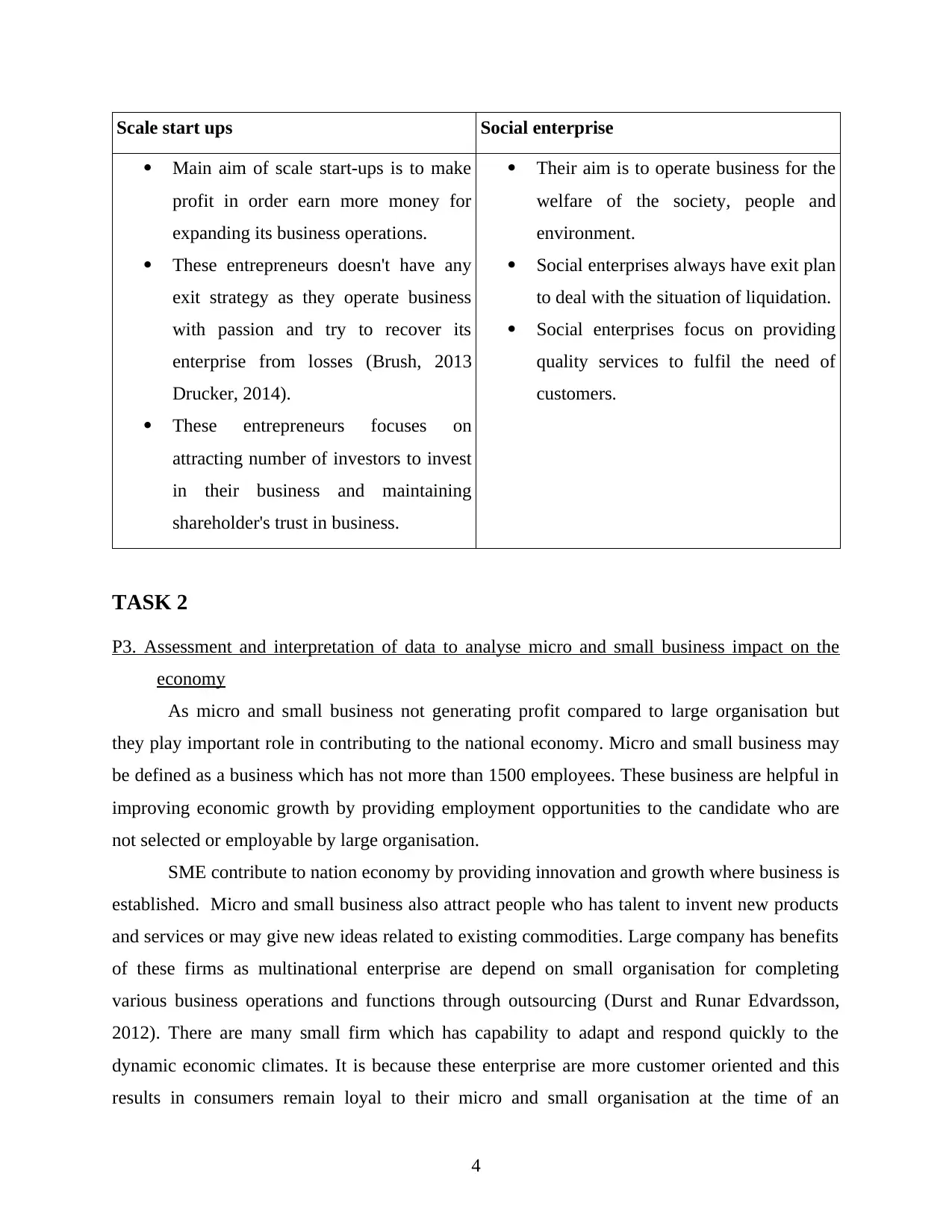
Scale start ups Social enterprise
Main aim of scale start-ups is to make
profit in order earn more money for
expanding its business operations.
These entrepreneurs doesn't have any
exit strategy as they operate business
with passion and try to recover its
enterprise from losses (Brush, 2013
Drucker, 2014).
These entrepreneurs focuses on
attracting number of investors to invest
in their business and maintaining
shareholder's trust in business.
Their aim is to operate business for the
welfare of the society, people and
environment.
Social enterprises always have exit plan
to deal with the situation of liquidation.
Social enterprises focus on providing
quality services to fulfil the need of
customers.
TASK 2
P3. Assessment and interpretation of data to analyse micro and small business impact on the
economy
As micro and small business not generating profit compared to large organisation but
they play important role in contributing to the national economy. Micro and small business may
be defined as a business which has not more than 1500 employees. These business are helpful in
improving economic growth by providing employment opportunities to the candidate who are
not selected or employable by large organisation.
SME contribute to nation economy by providing innovation and growth where business is
established. Micro and small business also attract people who has talent to invent new products
and services or may give new ideas related to existing commodities. Large company has benefits
of these firms as multinational enterprise are depend on small organisation for completing
various business operations and functions through outsourcing (Durst and Runar Edvardsson,
2012). There are many small firm which has capability to adapt and respond quickly to the
dynamic economic climates. It is because these enterprise are more customer oriented and this
results in consumers remain loyal to their micro and small organisation at the time of an
4
Main aim of scale start-ups is to make
profit in order earn more money for
expanding its business operations.
These entrepreneurs doesn't have any
exit strategy as they operate business
with passion and try to recover its
enterprise from losses (Brush, 2013
Drucker, 2014).
These entrepreneurs focuses on
attracting number of investors to invest
in their business and maintaining
shareholder's trust in business.
Their aim is to operate business for the
welfare of the society, people and
environment.
Social enterprises always have exit plan
to deal with the situation of liquidation.
Social enterprises focus on providing
quality services to fulfil the need of
customers.
TASK 2
P3. Assessment and interpretation of data to analyse micro and small business impact on the
economy
As micro and small business not generating profit compared to large organisation but
they play important role in contributing to the national economy. Micro and small business may
be defined as a business which has not more than 1500 employees. These business are helpful in
improving economic growth by providing employment opportunities to the candidate who are
not selected or employable by large organisation.
SME contribute to nation economy by providing innovation and growth where business is
established. Micro and small business also attract people who has talent to invent new products
and services or may give new ideas related to existing commodities. Large company has benefits
of these firms as multinational enterprise are depend on small organisation for completing
various business operations and functions through outsourcing (Durst and Runar Edvardsson,
2012). There are many small firm which has capability to adapt and respond quickly to the
dynamic economic climates. It is because these enterprise are more customer oriented and this
results in consumers remain loyal to their micro and small organisation at the time of an
4
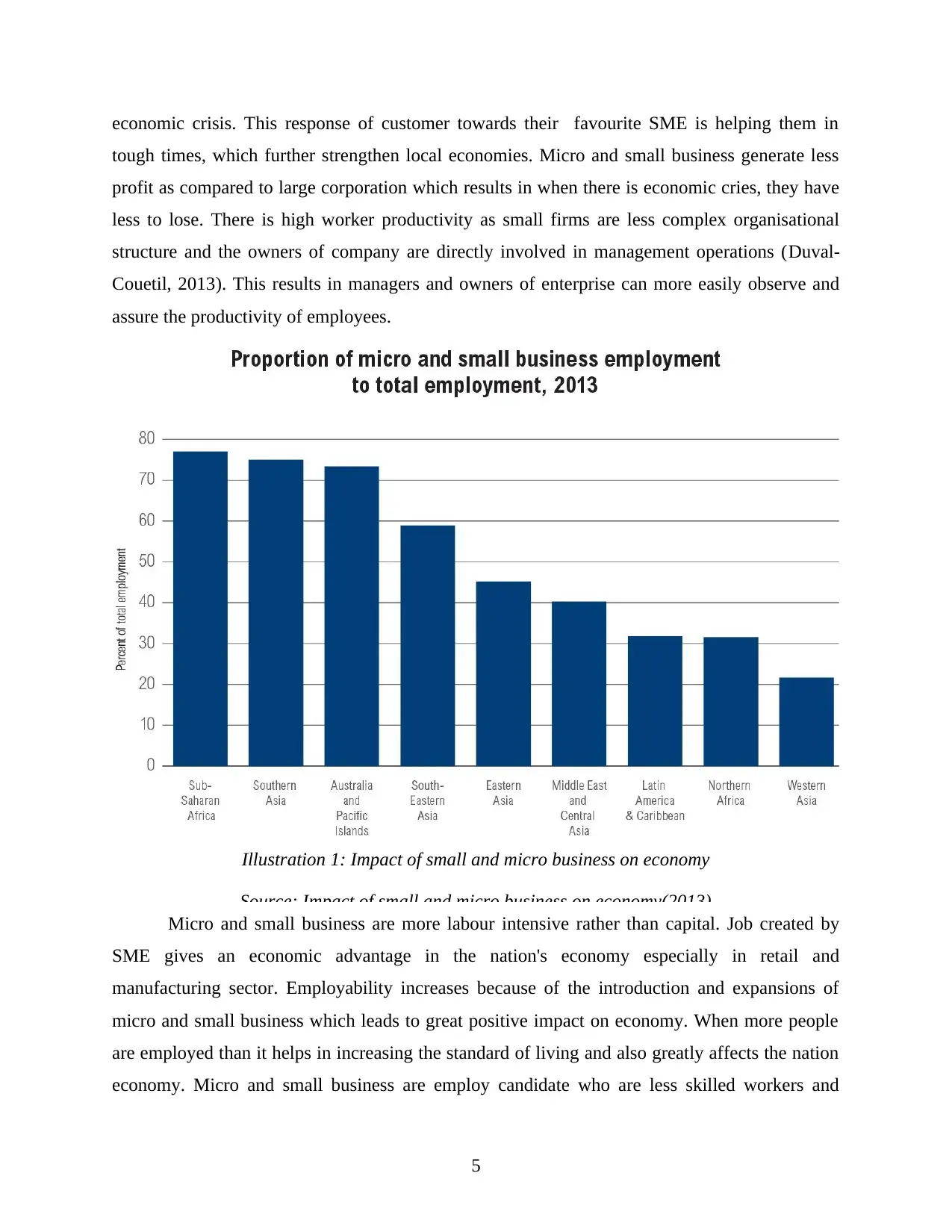
economic crisis. This response of customer towards their favourite SME is helping them in
tough times, which further strengthen local economies. Micro and small business generate less
profit as compared to large corporation which results in when there is economic cries, they have
less to lose. There is high worker productivity as small firms are less complex organisational
structure and the owners of company are directly involved in management operations (Duval‐
Couetil, 2013). This results in managers and owners of enterprise can more easily observe and
assure the productivity of employees.
Illustration 1: Impact of small and micro business on economy
Source: Impact of small and micro business on economy(2013)
Micro and small business are more labour intensive rather than capital. Job created by
SME gives an economic advantage in the nation's economy especially in retail and
manufacturing sector. Employability increases because of the introduction and expansions of
micro and small business which leads to great positive impact on economy. When more people
are employed than it helps in increasing the standard of living and also greatly affects the nation
economy. Micro and small business are employ candidate who are less skilled workers and
5
tough times, which further strengthen local economies. Micro and small business generate less
profit as compared to large corporation which results in when there is economic cries, they have
less to lose. There is high worker productivity as small firms are less complex organisational
structure and the owners of company are directly involved in management operations (Duval‐
Couetil, 2013). This results in managers and owners of enterprise can more easily observe and
assure the productivity of employees.
Illustration 1: Impact of small and micro business on economy
Source: Impact of small and micro business on economy(2013)
Micro and small business are more labour intensive rather than capital. Job created by
SME gives an economic advantage in the nation's economy especially in retail and
manufacturing sector. Employability increases because of the introduction and expansions of
micro and small business which leads to great positive impact on economy. When more people
are employed than it helps in increasing the standard of living and also greatly affects the nation
economy. Micro and small business are employ candidate who are less skilled workers and
5
Paraphrase This Document
Need a fresh take? Get an instant paraphrase of this document with our AI Paraphraser
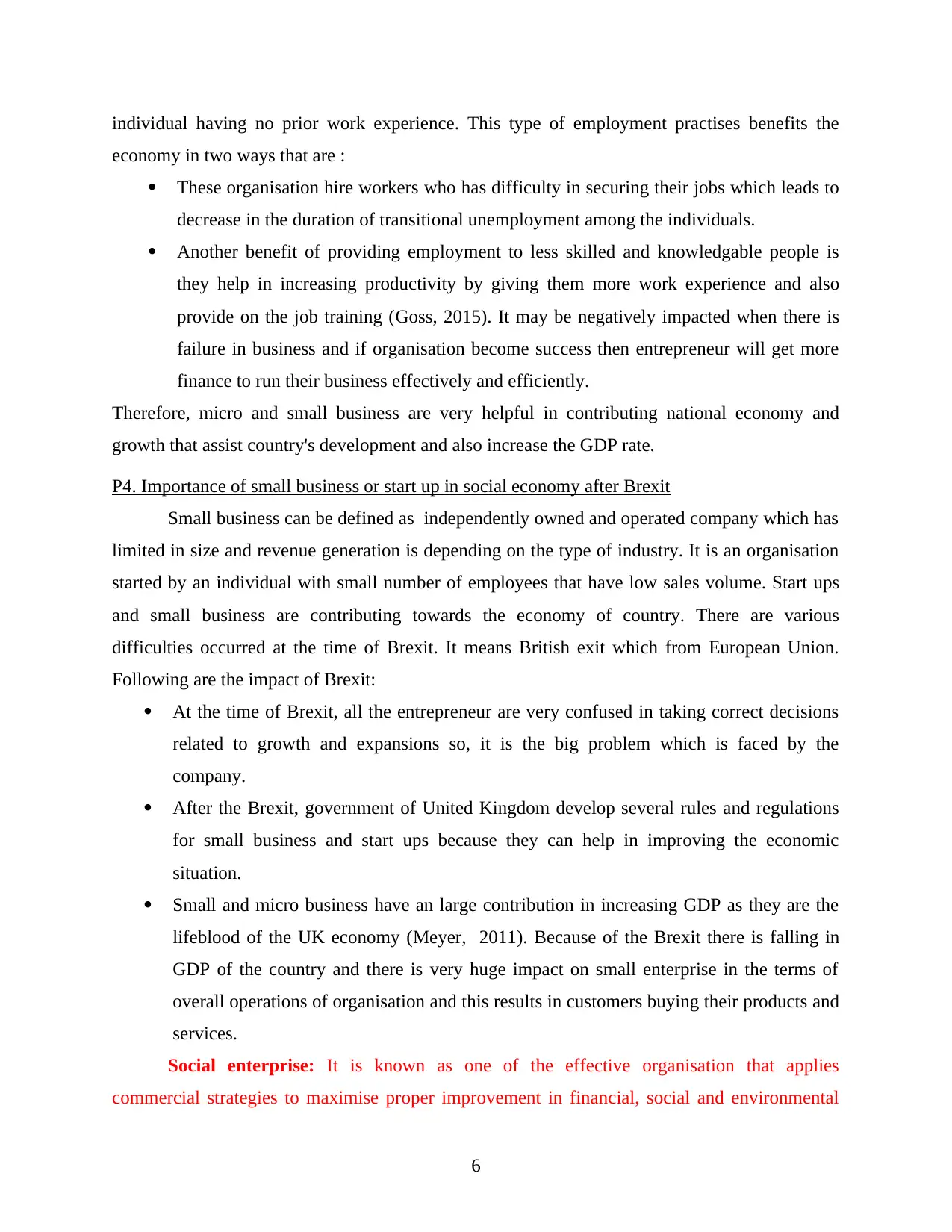
individual having no prior work experience. This type of employment practises benefits the
economy in two ways that are :
These organisation hire workers who has difficulty in securing their jobs which leads to
decrease in the duration of transitional unemployment among the individuals.
Another benefit of providing employment to less skilled and knowledgable people is
they help in increasing productivity by giving them more work experience and also
provide on the job training (Goss, 2015). It may be negatively impacted when there is
failure in business and if organisation become success then entrepreneur will get more
finance to run their business effectively and efficiently.
Therefore, micro and small business are very helpful in contributing national economy and
growth that assist country's development and also increase the GDP rate.
P4. Importance of small business or start up in social economy after Brexit
Small business can be defined as independently owned and operated company which has
limited in size and revenue generation is depending on the type of industry. It is an organisation
started by an individual with small number of employees that have low sales volume. Start ups
and small business are contributing towards the economy of country. There are various
difficulties occurred at the time of Brexit. It means British exit which from European Union.
Following are the impact of Brexit:
At the time of Brexit, all the entrepreneur are very confused in taking correct decisions
related to growth and expansions so, it is the big problem which is faced by the
company.
After the Brexit, government of United Kingdom develop several rules and regulations
for small business and start ups because they can help in improving the economic
situation.
Small and micro business have an large contribution in increasing GDP as they are the
lifeblood of the UK economy (Meyer, 2011). Because of the Brexit there is falling in
GDP of the country and there is very huge impact on small enterprise in the terms of
overall operations of organisation and this results in customers buying their products and
services.
Social enterprise: It is known as one of the effective organisation that applies
commercial strategies to maximise proper improvement in financial, social and environmental
6
economy in two ways that are :
These organisation hire workers who has difficulty in securing their jobs which leads to
decrease in the duration of transitional unemployment among the individuals.
Another benefit of providing employment to less skilled and knowledgable people is
they help in increasing productivity by giving them more work experience and also
provide on the job training (Goss, 2015). It may be negatively impacted when there is
failure in business and if organisation become success then entrepreneur will get more
finance to run their business effectively and efficiently.
Therefore, micro and small business are very helpful in contributing national economy and
growth that assist country's development and also increase the GDP rate.
P4. Importance of small business or start up in social economy after Brexit
Small business can be defined as independently owned and operated company which has
limited in size and revenue generation is depending on the type of industry. It is an organisation
started by an individual with small number of employees that have low sales volume. Start ups
and small business are contributing towards the economy of country. There are various
difficulties occurred at the time of Brexit. It means British exit which from European Union.
Following are the impact of Brexit:
At the time of Brexit, all the entrepreneur are very confused in taking correct decisions
related to growth and expansions so, it is the big problem which is faced by the
company.
After the Brexit, government of United Kingdom develop several rules and regulations
for small business and start ups because they can help in improving the economic
situation.
Small and micro business have an large contribution in increasing GDP as they are the
lifeblood of the UK economy (Meyer, 2011). Because of the Brexit there is falling in
GDP of the country and there is very huge impact on small enterprise in the terms of
overall operations of organisation and this results in customers buying their products and
services.
Social enterprise: It is known as one of the effective organisation that applies
commercial strategies to maximise proper improvement in financial, social and environmental
6
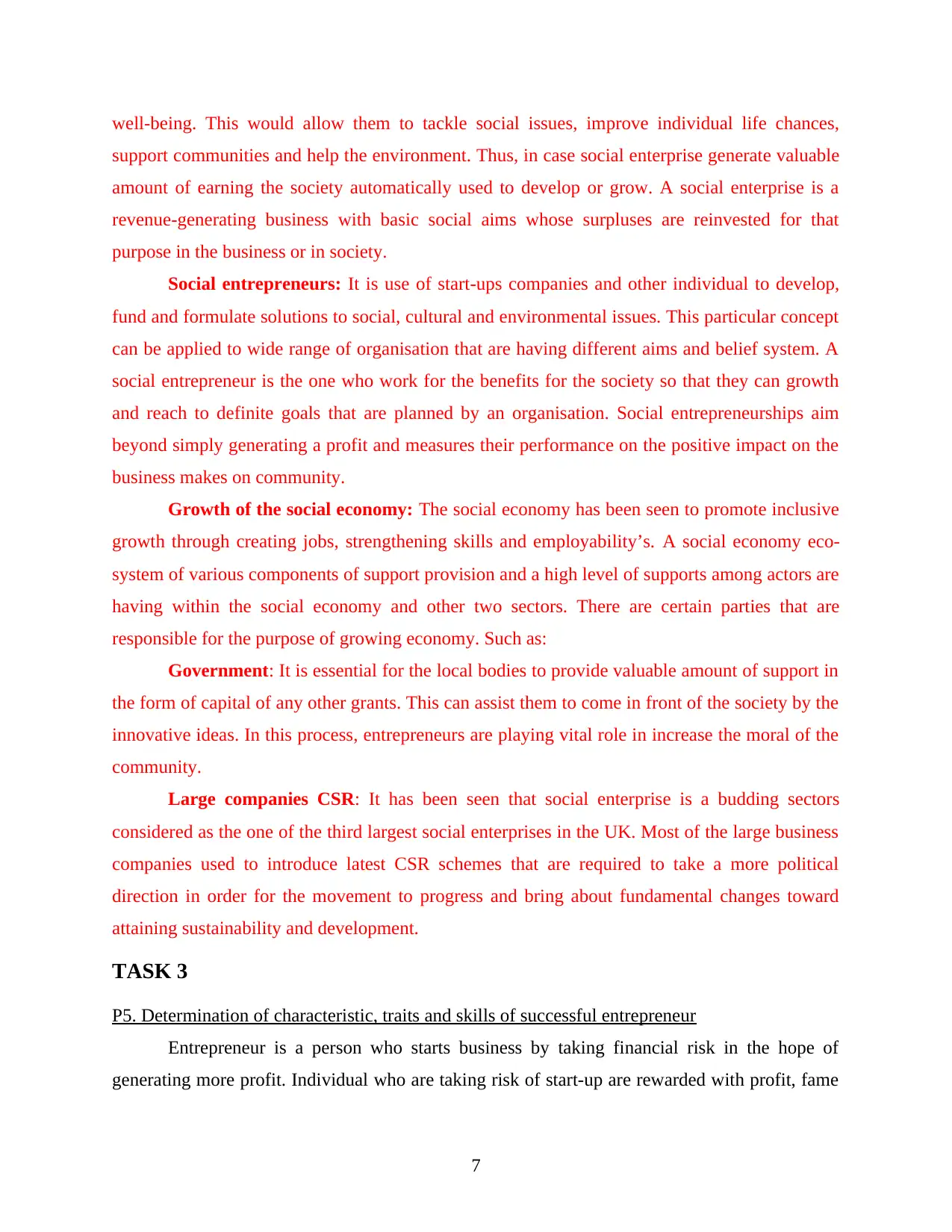
well-being. This would allow them to tackle social issues, improve individual life chances,
support communities and help the environment. Thus, in case social enterprise generate valuable
amount of earning the society automatically used to develop or grow. A social enterprise is a
revenue-generating business with basic social aims whose surpluses are reinvested for that
purpose in the business or in society.
Social entrepreneurs: It is use of start-ups companies and other individual to develop,
fund and formulate solutions to social, cultural and environmental issues. This particular concept
can be applied to wide range of organisation that are having different aims and belief system. A
social entrepreneur is the one who work for the benefits for the society so that they can growth
and reach to definite goals that are planned by an organisation. Social entrepreneurships aim
beyond simply generating a profit and measures their performance on the positive impact on the
business makes on community.
Growth of the social economy: The social economy has been seen to promote inclusive
growth through creating jobs, strengthening skills and employability’s. A social economy eco-
system of various components of support provision and a high level of supports among actors are
having within the social economy and other two sectors. There are certain parties that are
responsible for the purpose of growing economy. Such as:
Government: It is essential for the local bodies to provide valuable amount of support in
the form of capital of any other grants. This can assist them to come in front of the society by the
innovative ideas. In this process, entrepreneurs are playing vital role in increase the moral of the
community.
Large companies CSR: It has been seen that social enterprise is a budding sectors
considered as the one of the third largest social enterprises in the UK. Most of the large business
companies used to introduce latest CSR schemes that are required to take a more political
direction in order for the movement to progress and bring about fundamental changes toward
attaining sustainability and development.
TASK 3
P5. Determination of characteristic, traits and skills of successful entrepreneur
Entrepreneur is a person who starts business by taking financial risk in the hope of
generating more profit. Individual who are taking risk of start-up are rewarded with profit, fame
7
support communities and help the environment. Thus, in case social enterprise generate valuable
amount of earning the society automatically used to develop or grow. A social enterprise is a
revenue-generating business with basic social aims whose surpluses are reinvested for that
purpose in the business or in society.
Social entrepreneurs: It is use of start-ups companies and other individual to develop,
fund and formulate solutions to social, cultural and environmental issues. This particular concept
can be applied to wide range of organisation that are having different aims and belief system. A
social entrepreneur is the one who work for the benefits for the society so that they can growth
and reach to definite goals that are planned by an organisation. Social entrepreneurships aim
beyond simply generating a profit and measures their performance on the positive impact on the
business makes on community.
Growth of the social economy: The social economy has been seen to promote inclusive
growth through creating jobs, strengthening skills and employability’s. A social economy eco-
system of various components of support provision and a high level of supports among actors are
having within the social economy and other two sectors. There are certain parties that are
responsible for the purpose of growing economy. Such as:
Government: It is essential for the local bodies to provide valuable amount of support in
the form of capital of any other grants. This can assist them to come in front of the society by the
innovative ideas. In this process, entrepreneurs are playing vital role in increase the moral of the
community.
Large companies CSR: It has been seen that social enterprise is a budding sectors
considered as the one of the third largest social enterprises in the UK. Most of the large business
companies used to introduce latest CSR schemes that are required to take a more political
direction in order for the movement to progress and bring about fundamental changes toward
attaining sustainability and development.
TASK 3
P5. Determination of characteristic, traits and skills of successful entrepreneur
Entrepreneur is a person who starts business by taking financial risk in the hope of
generating more profit. Individual who are taking risk of start-up are rewarded with profit, fame
7
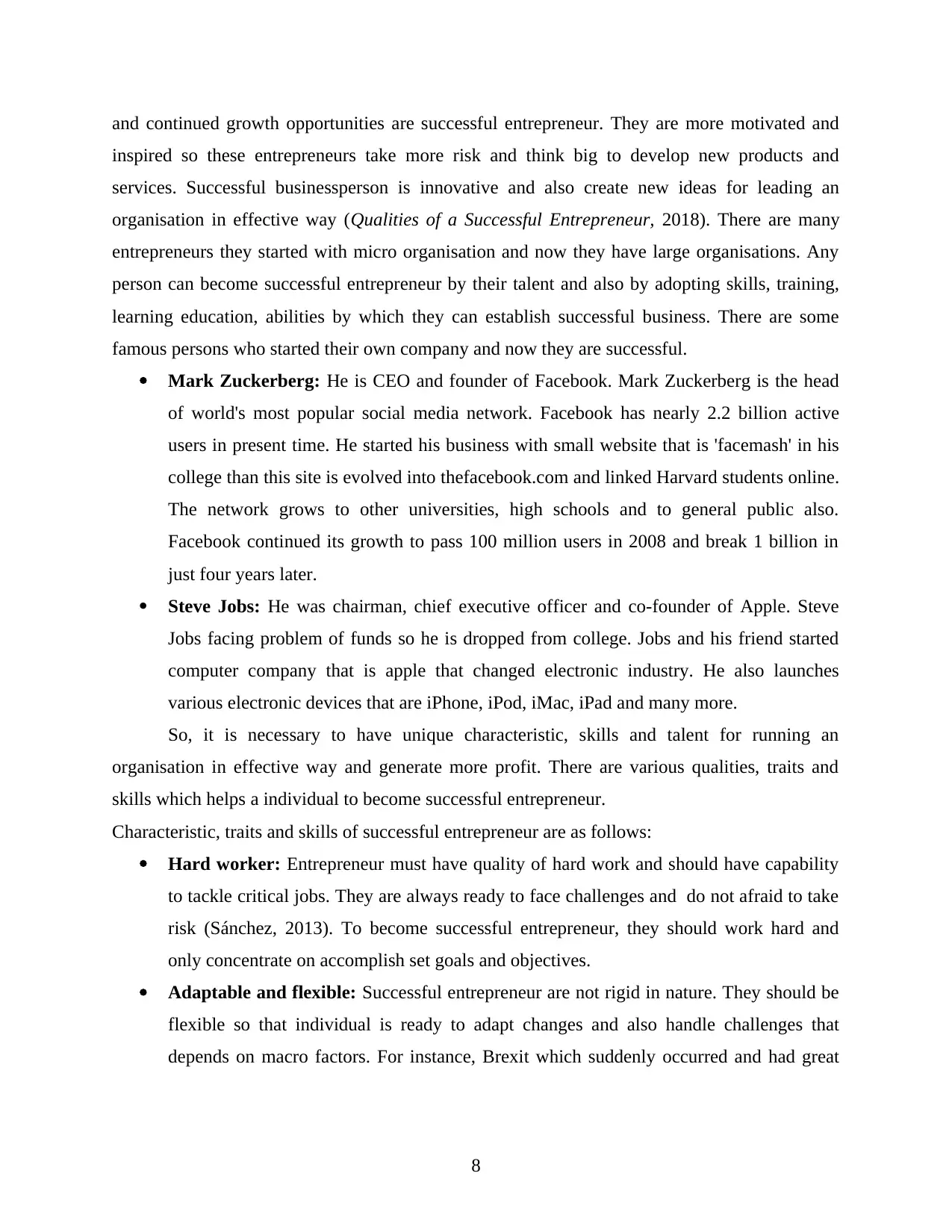
and continued growth opportunities are successful entrepreneur. They are more motivated and
inspired so these entrepreneurs take more risk and think big to develop new products and
services. Successful businessperson is innovative and also create new ideas for leading an
organisation in effective way (Qualities of a Successful Entrepreneur, 2018). There are many
entrepreneurs they started with micro organisation and now they have large organisations. Any
person can become successful entrepreneur by their talent and also by adopting skills, training,
learning education, abilities by which they can establish successful business. There are some
famous persons who started their own company and now they are successful.
Mark Zuckerberg: He is CEO and founder of Facebook. Mark Zuckerberg is the head
of world's most popular social media network. Facebook has nearly 2.2 billion active
users in present time. He started his business with small website that is 'facemash' in his
college than this site is evolved into thefacebook.com and linked Harvard students online.
The network grows to other universities, high schools and to general public also.
Facebook continued its growth to pass 100 million users in 2008 and break 1 billion in
just four years later.
Steve Jobs: He was chairman, chief executive officer and co-founder of Apple. Steve
Jobs facing problem of funds so he is dropped from college. Jobs and his friend started
computer company that is apple that changed electronic industry. He also launches
various electronic devices that are iPhone, iPod, iMac, iPad and many more.
So, it is necessary to have unique characteristic, skills and talent for running an
organisation in effective way and generate more profit. There are various qualities, traits and
skills which helps a individual to become successful entrepreneur.
Characteristic, traits and skills of successful entrepreneur are as follows:
Hard worker: Entrepreneur must have quality of hard work and should have capability
to tackle critical jobs. They are always ready to face challenges and do not afraid to take
risk (Sánchez, 2013). To become successful entrepreneur, they should work hard and
only concentrate on accomplish set goals and objectives.
Adaptable and flexible: Successful entrepreneur are not rigid in nature. They should be
flexible so that individual is ready to adapt changes and also handle challenges that
depends on macro factors. For instance, Brexit which suddenly occurred and had great
8
inspired so these entrepreneurs take more risk and think big to develop new products and
services. Successful businessperson is innovative and also create new ideas for leading an
organisation in effective way (Qualities of a Successful Entrepreneur, 2018). There are many
entrepreneurs they started with micro organisation and now they have large organisations. Any
person can become successful entrepreneur by their talent and also by adopting skills, training,
learning education, abilities by which they can establish successful business. There are some
famous persons who started their own company and now they are successful.
Mark Zuckerberg: He is CEO and founder of Facebook. Mark Zuckerberg is the head
of world's most popular social media network. Facebook has nearly 2.2 billion active
users in present time. He started his business with small website that is 'facemash' in his
college than this site is evolved into thefacebook.com and linked Harvard students online.
The network grows to other universities, high schools and to general public also.
Facebook continued its growth to pass 100 million users in 2008 and break 1 billion in
just four years later.
Steve Jobs: He was chairman, chief executive officer and co-founder of Apple. Steve
Jobs facing problem of funds so he is dropped from college. Jobs and his friend started
computer company that is apple that changed electronic industry. He also launches
various electronic devices that are iPhone, iPod, iMac, iPad and many more.
So, it is necessary to have unique characteristic, skills and talent for running an
organisation in effective way and generate more profit. There are various qualities, traits and
skills which helps a individual to become successful entrepreneur.
Characteristic, traits and skills of successful entrepreneur are as follows:
Hard worker: Entrepreneur must have quality of hard work and should have capability
to tackle critical jobs. They are always ready to face challenges and do not afraid to take
risk (Sánchez, 2013). To become successful entrepreneur, they should work hard and
only concentrate on accomplish set goals and objectives.
Adaptable and flexible: Successful entrepreneur are not rigid in nature. They should be
flexible so that individual is ready to adapt changes and also handle challenges that
depends on macro factors. For instance, Brexit which suddenly occurred and had great
8
Secure Best Marks with AI Grader
Need help grading? Try our AI Grader for instant feedback on your assignments.
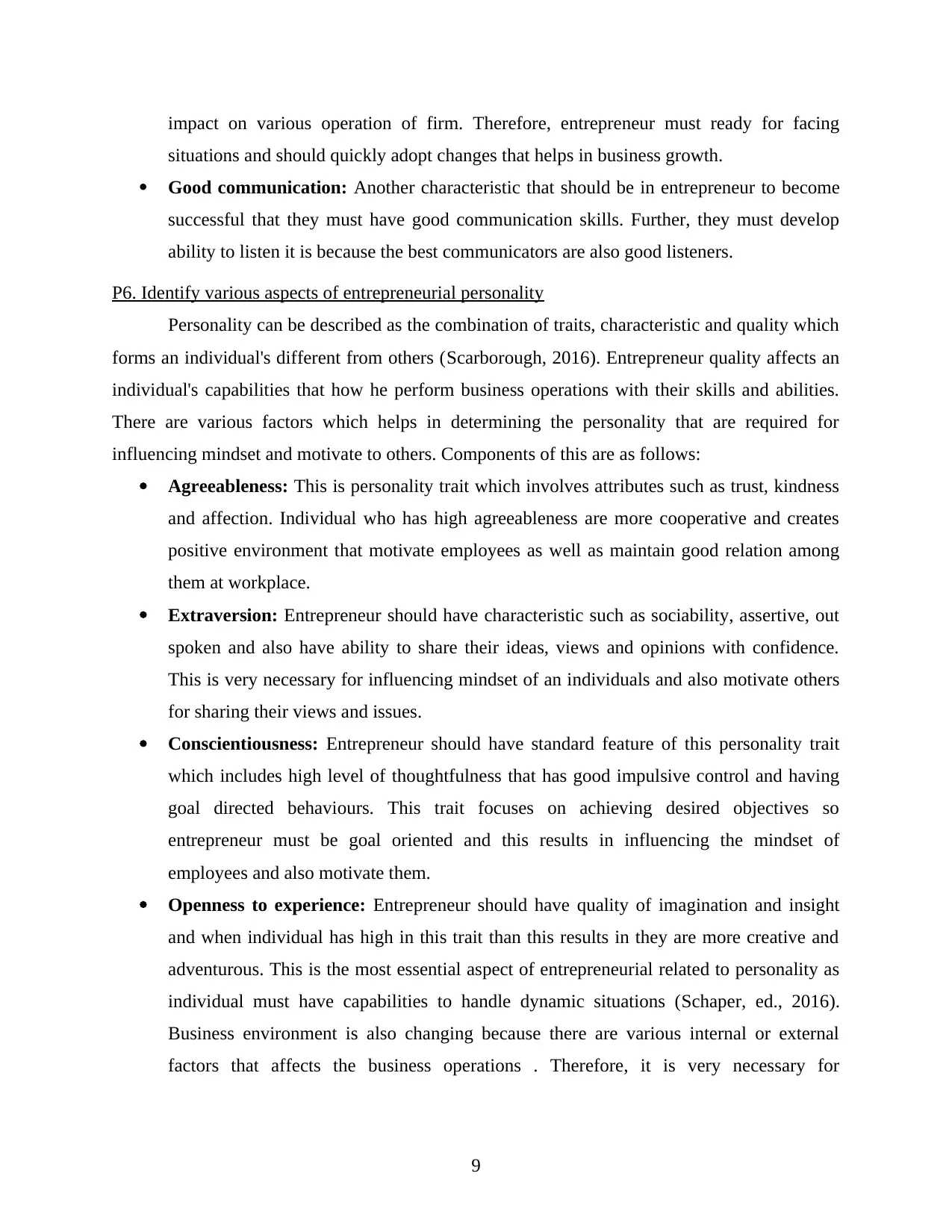
impact on various operation of firm. Therefore, entrepreneur must ready for facing
situations and should quickly adopt changes that helps in business growth.
Good communication: Another characteristic that should be in entrepreneur to become
successful that they must have good communication skills. Further, they must develop
ability to listen it is because the best communicators are also good listeners.
P6. Identify various aspects of entrepreneurial personality
Personality can be described as the combination of traits, characteristic and quality which
forms an individual's different from others (Scarborough, 2016). Entrepreneur quality affects an
individual's capabilities that how he perform business operations with their skills and abilities.
There are various factors which helps in determining the personality that are required for
influencing mindset and motivate to others. Components of this are as follows:
Agreeableness: This is personality trait which involves attributes such as trust, kindness
and affection. Individual who has high agreeableness are more cooperative and creates
positive environment that motivate employees as well as maintain good relation among
them at workplace.
Extraversion: Entrepreneur should have characteristic such as sociability, assertive, out
spoken and also have ability to share their ideas, views and opinions with confidence.
This is very necessary for influencing mindset of an individuals and also motivate others
for sharing their views and issues.
Conscientiousness: Entrepreneur should have standard feature of this personality trait
which includes high level of thoughtfulness that has good impulsive control and having
goal directed behaviours. This trait focuses on achieving desired objectives so
entrepreneur must be goal oriented and this results in influencing the mindset of
employees and also motivate them.
Openness to experience: Entrepreneur should have quality of imagination and insight
and when individual has high in this trait than this results in they are more creative and
adventurous. This is the most essential aspect of entrepreneurial related to personality as
individual must have capabilities to handle dynamic situations (Schaper, ed., 2016).
Business environment is also changing because there are various internal or external
factors that affects the business operations . Therefore, it is very necessary for
9
situations and should quickly adopt changes that helps in business growth.
Good communication: Another characteristic that should be in entrepreneur to become
successful that they must have good communication skills. Further, they must develop
ability to listen it is because the best communicators are also good listeners.
P6. Identify various aspects of entrepreneurial personality
Personality can be described as the combination of traits, characteristic and quality which
forms an individual's different from others (Scarborough, 2016). Entrepreneur quality affects an
individual's capabilities that how he perform business operations with their skills and abilities.
There are various factors which helps in determining the personality that are required for
influencing mindset and motivate to others. Components of this are as follows:
Agreeableness: This is personality trait which involves attributes such as trust, kindness
and affection. Individual who has high agreeableness are more cooperative and creates
positive environment that motivate employees as well as maintain good relation among
them at workplace.
Extraversion: Entrepreneur should have characteristic such as sociability, assertive, out
spoken and also have ability to share their ideas, views and opinions with confidence.
This is very necessary for influencing mindset of an individuals and also motivate others
for sharing their views and issues.
Conscientiousness: Entrepreneur should have standard feature of this personality trait
which includes high level of thoughtfulness that has good impulsive control and having
goal directed behaviours. This trait focuses on achieving desired objectives so
entrepreneur must be goal oriented and this results in influencing the mindset of
employees and also motivate them.
Openness to experience: Entrepreneur should have quality of imagination and insight
and when individual has high in this trait than this results in they are more creative and
adventurous. This is the most essential aspect of entrepreneurial related to personality as
individual must have capabilities to handle dynamic situations (Schaper, ed., 2016).
Business environment is also changing because there are various internal or external
factors that affects the business operations . Therefore, it is very necessary for
9
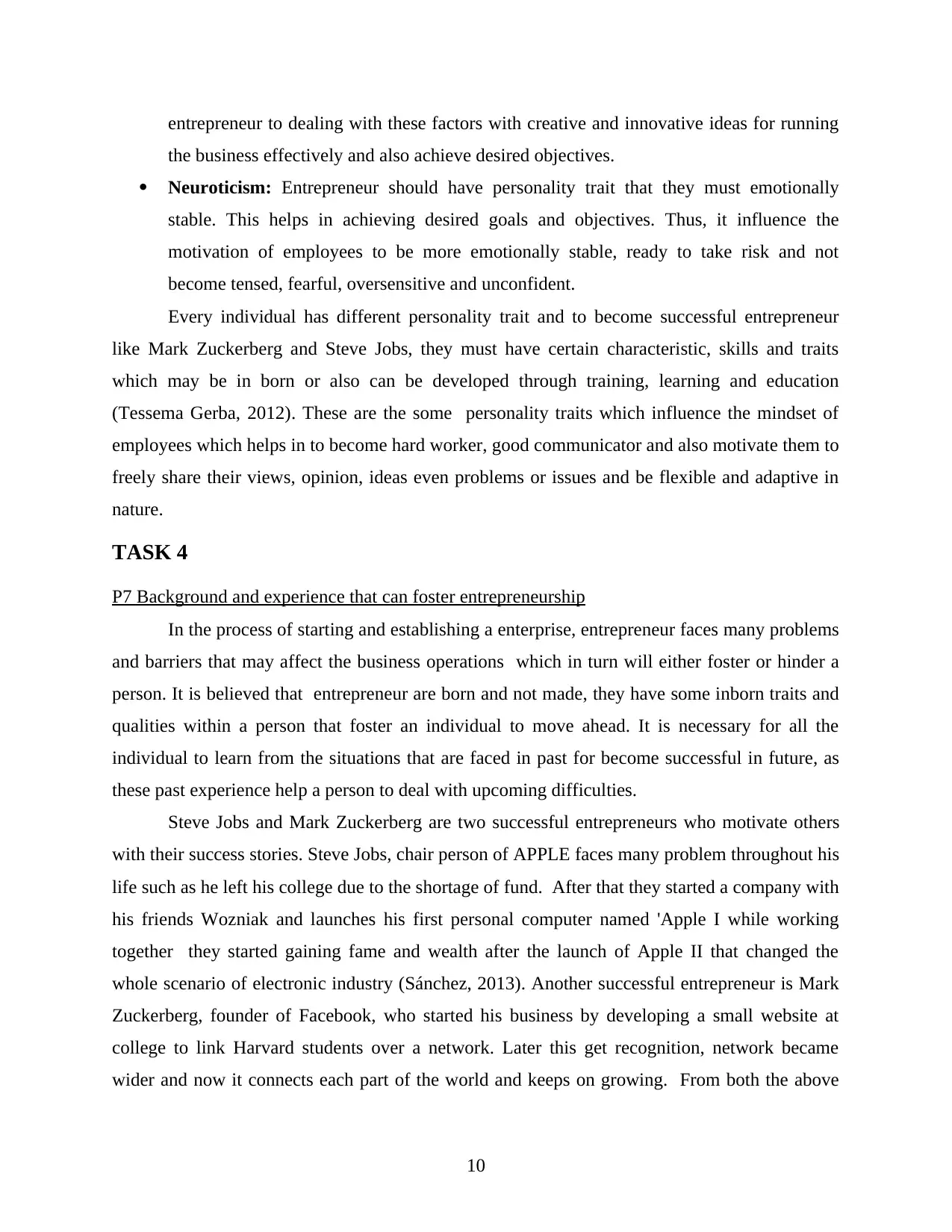
entrepreneur to dealing with these factors with creative and innovative ideas for running
the business effectively and also achieve desired objectives.
Neuroticism: Entrepreneur should have personality trait that they must emotionally
stable. This helps in achieving desired goals and objectives. Thus, it influence the
motivation of employees to be more emotionally stable, ready to take risk and not
become tensed, fearful, oversensitive and unconfident.
Every individual has different personality trait and to become successful entrepreneur
like Mark Zuckerberg and Steve Jobs, they must have certain characteristic, skills and traits
which may be in born or also can be developed through training, learning and education
(Tessema Gerba, 2012). These are the some personality traits which influence the mindset of
employees which helps in to become hard worker, good communicator and also motivate them to
freely share their views, opinion, ideas even problems or issues and be flexible and adaptive in
nature.
TASK 4
P7 Background and experience that can foster entrepreneurship
In the process of starting and establishing a enterprise, entrepreneur faces many problems
and barriers that may affect the business operations which in turn will either foster or hinder a
person. It is believed that entrepreneur are born and not made, they have some inborn traits and
qualities within a person that foster an individual to move ahead. It is necessary for all the
individual to learn from the situations that are faced in past for become successful in future, as
these past experience help a person to deal with upcoming difficulties.
Steve Jobs and Mark Zuckerberg are two successful entrepreneurs who motivate others
with their success stories. Steve Jobs, chair person of APPLE faces many problem throughout his
life such as he left his college due to the shortage of fund. After that they started a company with
his friends Wozniak and launches his first personal computer named 'Apple I while working
together they started gaining fame and wealth after the launch of Apple II that changed the
whole scenario of electronic industry (Sánchez, 2013). Another successful entrepreneur is Mark
Zuckerberg, founder of Facebook, who started his business by developing a small website at
college to link Harvard students over a network. Later this get recognition, network became
wider and now it connects each part of the world and keeps on growing. From both the above
10
the business effectively and also achieve desired objectives.
Neuroticism: Entrepreneur should have personality trait that they must emotionally
stable. This helps in achieving desired goals and objectives. Thus, it influence the
motivation of employees to be more emotionally stable, ready to take risk and not
become tensed, fearful, oversensitive and unconfident.
Every individual has different personality trait and to become successful entrepreneur
like Mark Zuckerberg and Steve Jobs, they must have certain characteristic, skills and traits
which may be in born or also can be developed through training, learning and education
(Tessema Gerba, 2012). These are the some personality traits which influence the mindset of
employees which helps in to become hard worker, good communicator and also motivate them to
freely share their views, opinion, ideas even problems or issues and be flexible and adaptive in
nature.
TASK 4
P7 Background and experience that can foster entrepreneurship
In the process of starting and establishing a enterprise, entrepreneur faces many problems
and barriers that may affect the business operations which in turn will either foster or hinder a
person. It is believed that entrepreneur are born and not made, they have some inborn traits and
qualities within a person that foster an individual to move ahead. It is necessary for all the
individual to learn from the situations that are faced in past for become successful in future, as
these past experience help a person to deal with upcoming difficulties.
Steve Jobs and Mark Zuckerberg are two successful entrepreneurs who motivate others
with their success stories. Steve Jobs, chair person of APPLE faces many problem throughout his
life such as he left his college due to the shortage of fund. After that they started a company with
his friends Wozniak and launches his first personal computer named 'Apple I while working
together they started gaining fame and wealth after the launch of Apple II that changed the
whole scenario of electronic industry (Sánchez, 2013). Another successful entrepreneur is Mark
Zuckerberg, founder of Facebook, who started his business by developing a small website at
college to link Harvard students over a network. Later this get recognition, network became
wider and now it connects each part of the world and keeps on growing. From both the above
10
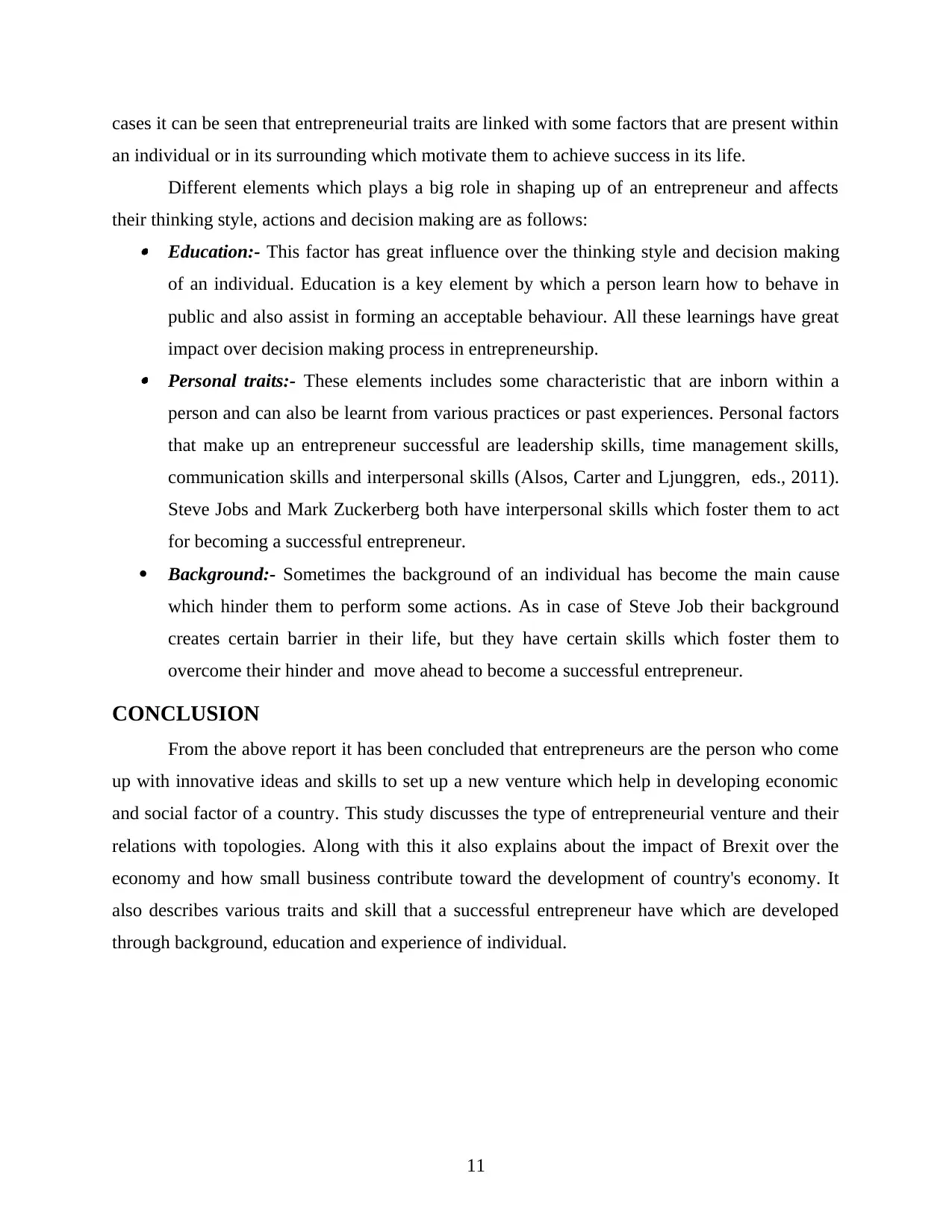
cases it can be seen that entrepreneurial traits are linked with some factors that are present within
an individual or in its surrounding which motivate them to achieve success in its life.
Different elements which plays a big role in shaping up of an entrepreneur and affects
their thinking style, actions and decision making are as follows: Education:- This factor has great influence over the thinking style and decision making
of an individual. Education is a key element by which a person learn how to behave in
public and also assist in forming an acceptable behaviour. All these learnings have great
impact over decision making process in entrepreneurship. Personal traits:- These elements includes some characteristic that are inborn within a
person and can also be learnt from various practices or past experiences. Personal factors
that make up an entrepreneur successful are leadership skills, time management skills,
communication skills and interpersonal skills (Alsos, Carter and Ljunggren, eds., 2011).
Steve Jobs and Mark Zuckerberg both have interpersonal skills which foster them to act
for becoming a successful entrepreneur.
Background:- Sometimes the background of an individual has become the main cause
which hinder them to perform some actions. As in case of Steve Job their background
creates certain barrier in their life, but they have certain skills which foster them to
overcome their hinder and move ahead to become a successful entrepreneur.
CONCLUSION
From the above report it has been concluded that entrepreneurs are the person who come
up with innovative ideas and skills to set up a new venture which help in developing economic
and social factor of a country. This study discusses the type of entrepreneurial venture and their
relations with topologies. Along with this it also explains about the impact of Brexit over the
economy and how small business contribute toward the development of country's economy. It
also describes various traits and skill that a successful entrepreneur have which are developed
through background, education and experience of individual.
11
an individual or in its surrounding which motivate them to achieve success in its life.
Different elements which plays a big role in shaping up of an entrepreneur and affects
their thinking style, actions and decision making are as follows: Education:- This factor has great influence over the thinking style and decision making
of an individual. Education is a key element by which a person learn how to behave in
public and also assist in forming an acceptable behaviour. All these learnings have great
impact over decision making process in entrepreneurship. Personal traits:- These elements includes some characteristic that are inborn within a
person and can also be learnt from various practices or past experiences. Personal factors
that make up an entrepreneur successful are leadership skills, time management skills,
communication skills and interpersonal skills (Alsos, Carter and Ljunggren, eds., 2011).
Steve Jobs and Mark Zuckerberg both have interpersonal skills which foster them to act
for becoming a successful entrepreneur.
Background:- Sometimes the background of an individual has become the main cause
which hinder them to perform some actions. As in case of Steve Job their background
creates certain barrier in their life, but they have certain skills which foster them to
overcome their hinder and move ahead to become a successful entrepreneur.
CONCLUSION
From the above report it has been concluded that entrepreneurs are the person who come
up with innovative ideas and skills to set up a new venture which help in developing economic
and social factor of a country. This study discusses the type of entrepreneurial venture and their
relations with topologies. Along with this it also explains about the impact of Brexit over the
economy and how small business contribute toward the development of country's economy. It
also describes various traits and skill that a successful entrepreneur have which are developed
through background, education and experience of individual.
11
Paraphrase This Document
Need a fresh take? Get an instant paraphrase of this document with our AI Paraphraser
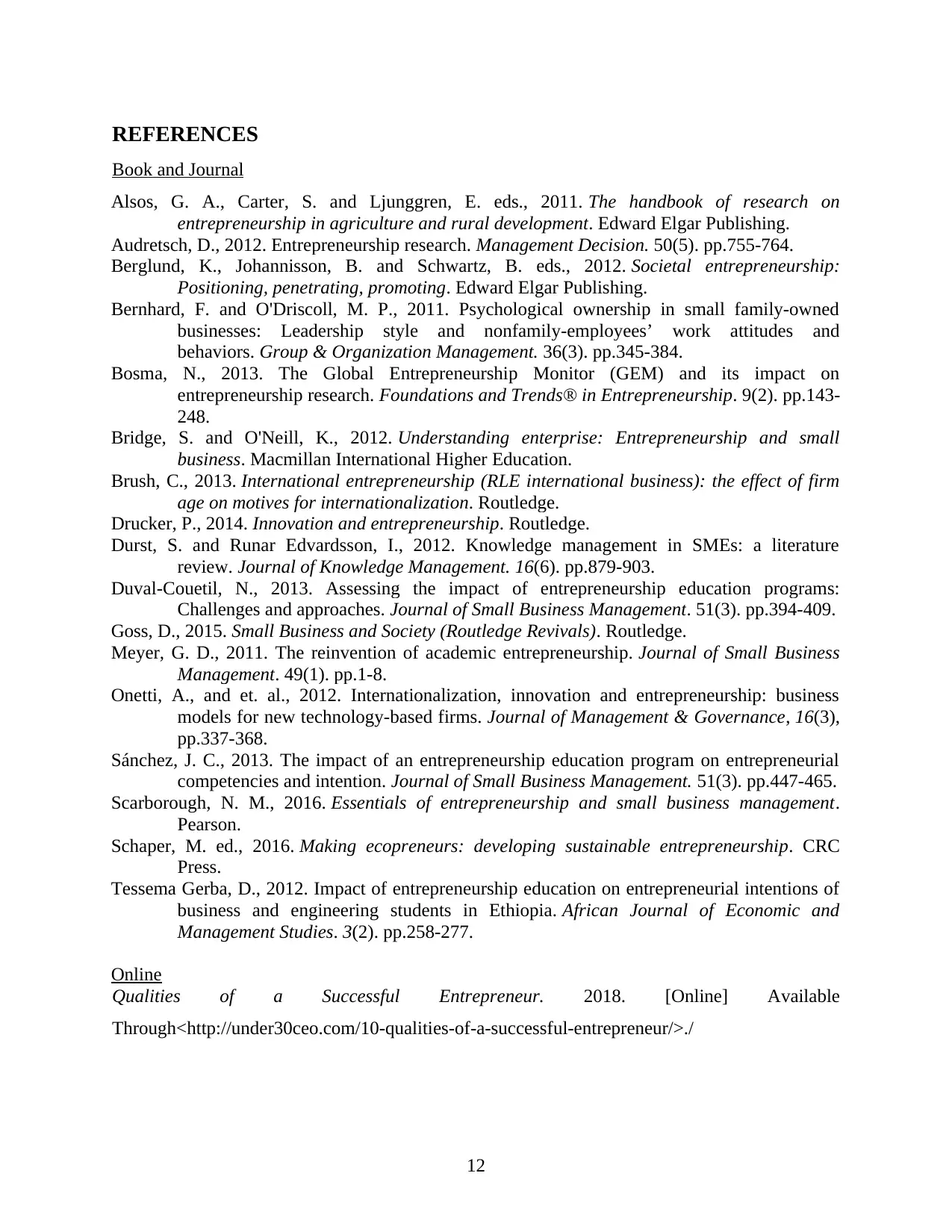
REFERENCES
Book and Journal
Alsos, G. A., Carter, S. and Ljunggren, E. eds., 2011. The handbook of research on
entrepreneurship in agriculture and rural development. Edward Elgar Publishing.
Audretsch, D., 2012. Entrepreneurship research. Management Decision. 50(5). pp.755-764.
Berglund, K., Johannisson, B. and Schwartz, B. eds., 2012. Societal entrepreneurship:
Positioning, penetrating, promoting. Edward Elgar Publishing.
Bernhard, F. and O'Driscoll, M. P., 2011. Psychological ownership in small family-owned
businesses: Leadership style and nonfamily-employees’ work attitudes and
behaviors. Group & Organization Management. 36(3). pp.345-384.
Bosma, N., 2013. The Global Entrepreneurship Monitor (GEM) and its impact on
entrepreneurship research. Foundations and Trends® in Entrepreneurship. 9(2). pp.143-
248.
Bridge, S. and O'Neill, K., 2012. Understanding enterprise: Entrepreneurship and small
business. Macmillan International Higher Education.
Brush, C., 2013. International entrepreneurship (RLE international business): the effect of firm
age on motives for internationalization. Routledge.
Drucker, P., 2014. Innovation and entrepreneurship. Routledge.
Durst, S. and Runar Edvardsson, I., 2012. Knowledge management in SMEs: a literature
review. Journal of Knowledge Management. 16(6). pp.879-903.
Duval‐Couetil, N., 2013. Assessing the impact of entrepreneurship education programs:
Challenges and approaches. Journal of Small Business Management. 51(3). pp.394-409.
Goss, D., 2015. Small Business and Society (Routledge Revivals). Routledge.
Meyer, G. D., 2011. The reinvention of academic entrepreneurship. Journal of Small Business
Management. 49(1). pp.1-8.
Onetti, A., and et. al., 2012. Internationalization, innovation and entrepreneurship: business
models for new technology-based firms. Journal of Management & Governance, 16(3),
pp.337-368.
Sánchez, J. C., 2013. The impact of an entrepreneurship education program on entrepreneurial
competencies and intention. Journal of Small Business Management. 51(3). pp.447-465.
Scarborough, N. M., 2016. Essentials of entrepreneurship and small business management.
Pearson.
Schaper, M. ed., 2016. Making ecopreneurs: developing sustainable entrepreneurship. CRC
Press.
Tessema Gerba, D., 2012. Impact of entrepreneurship education on entrepreneurial intentions of
business and engineering students in Ethiopia. African Journal of Economic and
Management Studies. 3(2). pp.258-277.
Online
Qualities of a Successful Entrepreneur. 2018. [Online] Available
Through<http://under30ceo.com/10-qualities-of-a-successful-entrepreneur/>./
12
Book and Journal
Alsos, G. A., Carter, S. and Ljunggren, E. eds., 2011. The handbook of research on
entrepreneurship in agriculture and rural development. Edward Elgar Publishing.
Audretsch, D., 2012. Entrepreneurship research. Management Decision. 50(5). pp.755-764.
Berglund, K., Johannisson, B. and Schwartz, B. eds., 2012. Societal entrepreneurship:
Positioning, penetrating, promoting. Edward Elgar Publishing.
Bernhard, F. and O'Driscoll, M. P., 2011. Psychological ownership in small family-owned
businesses: Leadership style and nonfamily-employees’ work attitudes and
behaviors. Group & Organization Management. 36(3). pp.345-384.
Bosma, N., 2013. The Global Entrepreneurship Monitor (GEM) and its impact on
entrepreneurship research. Foundations and Trends® in Entrepreneurship. 9(2). pp.143-
248.
Bridge, S. and O'Neill, K., 2012. Understanding enterprise: Entrepreneurship and small
business. Macmillan International Higher Education.
Brush, C., 2013. International entrepreneurship (RLE international business): the effect of firm
age on motives for internationalization. Routledge.
Drucker, P., 2014. Innovation and entrepreneurship. Routledge.
Durst, S. and Runar Edvardsson, I., 2012. Knowledge management in SMEs: a literature
review. Journal of Knowledge Management. 16(6). pp.879-903.
Duval‐Couetil, N., 2013. Assessing the impact of entrepreneurship education programs:
Challenges and approaches. Journal of Small Business Management. 51(3). pp.394-409.
Goss, D., 2015. Small Business and Society (Routledge Revivals). Routledge.
Meyer, G. D., 2011. The reinvention of academic entrepreneurship. Journal of Small Business
Management. 49(1). pp.1-8.
Onetti, A., and et. al., 2012. Internationalization, innovation and entrepreneurship: business
models for new technology-based firms. Journal of Management & Governance, 16(3),
pp.337-368.
Sánchez, J. C., 2013. The impact of an entrepreneurship education program on entrepreneurial
competencies and intention. Journal of Small Business Management. 51(3). pp.447-465.
Scarborough, N. M., 2016. Essentials of entrepreneurship and small business management.
Pearson.
Schaper, M. ed., 2016. Making ecopreneurs: developing sustainable entrepreneurship. CRC
Press.
Tessema Gerba, D., 2012. Impact of entrepreneurship education on entrepreneurial intentions of
business and engineering students in Ethiopia. African Journal of Economic and
Management Studies. 3(2). pp.258-277.
Online
Qualities of a Successful Entrepreneur. 2018. [Online] Available
Through<http://under30ceo.com/10-qualities-of-a-successful-entrepreneur/>./
12
1 out of 14
Related Documents
Your All-in-One AI-Powered Toolkit for Academic Success.
+13062052269
info@desklib.com
Available 24*7 on WhatsApp / Email
![[object Object]](/_next/static/media/star-bottom.7253800d.svg)
Unlock your academic potential
© 2024 | Zucol Services PVT LTD | All rights reserved.





